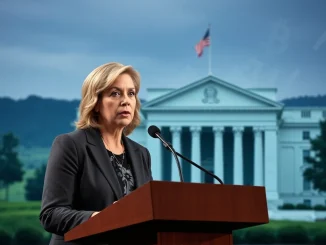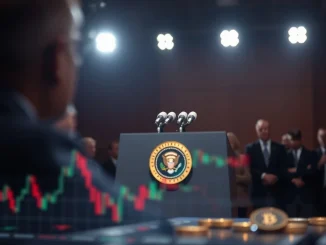
The digital currency realm is buzzing with anticipation as a new bipartisan force emerges in Washington D.C., poised to potentially reshape the future of crypto regulation in the United States. Meet the Congressional Crypto Caucus, a newly formed group spearheaded by House Representatives Tom Emmer and Ritchie Torres. This initiative signals a pivotal moment as lawmakers intensify their efforts to establish a clear and supportive framework for digital assets. Are we finally seeing a united front to propel the U.S. to the forefront of the crypto revolution?
What is the Congressional Crypto Caucus and Why is it a Game Changer for Crypto Regulation?
The Congressional Crypto Caucus is not just another political group; it’s a strategic alliance designed to bridge the partisan divide and foster informed discussions around cryptocurrencies and blockchain technology. Its core mission is crystal clear: to champion legislation that is both crypto-friendly and robust enough to protect consumers and foster innovation. Think of it as a dedicated team of lawmakers committed to understanding and nurturing the burgeoning crypto space.
Here’s why this caucus could be a game-changer:
- Bipartisan Approach: In today’s polarized political climate, bipartisanship is gold. The caucus, led by figures from both sides of the aisle, suggests a unified front on the importance of crypto regulation. This dramatically increases the likelihood of effective legislation passing through Congress.
- Focused Legislative Agenda: The caucus isn’t just about talk; it’s about action. They are laser-focused on specific legislative priorities, particularly stablecoin regulation and establishing clear market structure for digital assets. This targeted approach increases the chances of tangible outcomes.
- Timing is Everything: The launch coincides with growing momentum for crypto regulation. President Trump’s recent advocacy for U.S. leadership in digital assets, coupled with the Senate Banking Committee’s preparations to review the GENIUS Act and Senator Tim Scott’s ambitious timeline to pass key crypto bills by April, creates a fertile ground for the caucus’s initiatives.
- Industry Support and Mobilization: As reported by Fox Business’s Eleanor Terrett, the caucus is actively working to mobilize bipartisan support. This suggests a collaborative effort involving industry stakeholders, experts, and policymakers, enhancing the legitimacy and effectiveness of their proposals.
Decoding the Key Legislative Priorities: Stablecoin and Market Structure Bills
Let’s delve deeper into the legislative priorities at the heart of the Congressional Crypto Caucus’s agenda:
Stablecoin Legislation: Bringing Clarity to Digital Dollars
Stablecoins, cryptocurrencies designed to maintain a stable value, typically pegged to a fiat currency like the US dollar, are crucial for everyday crypto transactions and wider adoption. However, their regulatory status has been a gray area. The caucus aims to address this by:
- Defining Stablecoin Frameworks: Creating clear definitions and classifications for stablecoins to distinguish them from other cryptocurrencies and traditional securities.
- Establishing Regulatory Clarity: Providing guidelines on reserves, auditing, and operational standards for stablecoin issuers to ensure transparency and protect users from potential risks.
- Promoting Innovation and Trust: Crafting regulations that foster innovation in the stablecoin space while building trust and confidence in these digital assets.
Imagine a future where using stablecoins for daily transactions is as seamless and secure as using traditional digital payment methods. This is the future the caucus is striving to build.
Market Structure Bills: Shaping the Landscape for Crypto Trading
The current market structure for cryptocurrencies is often described as fragmented and lacking the robust investor protections found in traditional financial markets. The caucus aims to bring order and security to crypto trading by focusing on:
- Defining Regulatory Boundaries: Clarifying which agencies (like the SEC and CFTC) have jurisdiction over different types of crypto assets and activities to avoid regulatory overlap and confusion.
- Developing Trading Standards: Establishing rules for crypto exchanges and trading platforms to ensure fair trading practices, prevent market manipulation, and enhance price discovery.
- Investor Protection Measures: Implementing safeguards to protect crypto investors from fraud, scams, and excessive risks, mirroring the protections available in traditional securities markets.
A well-defined market structure is essential for attracting institutional investment and fostering the long-term growth of the crypto market. It’s about creating a level playing field where innovation can thrive within a secure and regulated environment.
The GENIUS Act and Senator Tim Scott’s Crypto Push: Complementary Efforts
The Congressional Crypto Caucus isn’t operating in isolation. Their efforts are amplified by other significant developments in the U.S. legislative landscape:
- Senator Hagerty’s GENIUS Act: The “GENIUS Act” ( головешка Enabling New Initiatives for Understanding Standards Act) is designed to foster innovation and competitiveness in emerging technologies, including blockchain and digital assets. Its review by the Senate Banking Committee signals a serious consideration of policies that support technological advancement in the crypto space.
- Senator Tim Scott’s Ambitious Timeline: Senator Scott’s aim to pass key crypto bills by April demonstrates a sense of urgency and commitment within the Senate to move swiftly on crypto regulation. This timeline aligns perfectly with the caucus’s objectives and could provide crucial momentum for their legislative agenda.
These parallel initiatives highlight a growing consensus across different parts of the U.S. government that the time for decisive action on crypto regulation is now.
What Does This Mean for the Future of Crypto in the U.S.?
The formation of the Congressional Crypto Caucus is a powerful signal that Washington is finally taking cryptocurrency seriously. It suggests a shift from a potentially reactive or hesitant approach to a more proactive and strategic stance on digital assets. If the caucus succeeds in its mission, we could see:
- Increased Regulatory Clarity: Businesses and innovators will benefit from clear rules of the road, reducing uncertainty and encouraging investment in the crypto space.
- Enhanced Investor Confidence: Stronger regulatory frameworks will build trust among investors, potentially attracting more capital into the crypto market and fostering wider adoption.
- U.S. Leadership in Crypto Innovation: By creating a supportive regulatory environment, the U.S. can position itself as a global leader in crypto innovation, attracting talent and businesses from around the world.
- Mainstream Crypto Adoption: Clear regulations can pave the way for greater integration of cryptocurrencies into the mainstream financial system, benefiting both consumers and the economy.
Navigating the Path Ahead: Challenges and Opportunities
While the emergence of the Congressional Crypto Caucus is undoubtedly a positive development, challenges remain. The devil will be in the details of the legislation they propose and how effectively they can navigate the complexities of the legislative process. However, the opportunity is immense – to shape a regulatory framework that unleashes the transformative potential of cryptocurrencies while mitigating risks.
Key Takeaways:
- The Congressional Crypto Caucus is a bipartisan initiative focused on advancing US crypto regulation.
- Their primary legislative goals are stablecoin and market structure bills.
- President Trump’s support and Senate activities indicate growing momentum for crypto legislation.
- The caucus aims to mobilize bipartisan support to finalize these regulatory efforts.
- Clear and effective regulation can foster innovation, investor confidence, and U.S. leadership in the crypto space.
Conclusion: A Watershed Moment for Crypto Regulation?
The launch of the Congressional Crypto Caucus is more than just another political development; it represents a potential watershed moment for the future of cryptocurrency in the United States. It’s a beacon of hope for those who believe in the transformative power of digital assets and have been waiting for Washington to catch up. As the caucus embarks on its mission, the crypto world watches with bated breath, hopeful that this bipartisan effort will indeed pave the way for a clear, sensible, and innovation-friendly regulatory landscape. The journey of crypto regulation in the U.S. is entering an exciting new chapter, and the Congressional Crypto Caucus is poised to play a leading role in writing it.



